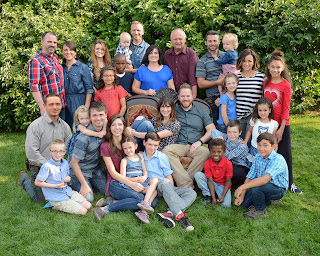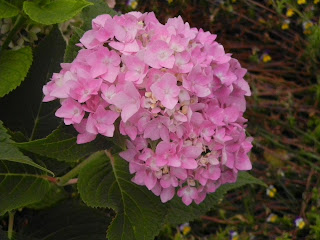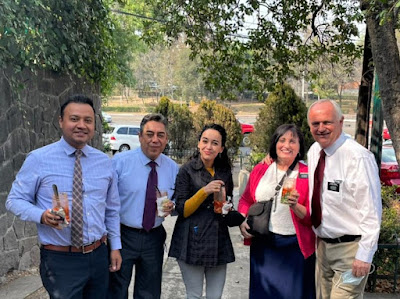My Journey to Motherhood

Hanging over
the stairway in my house is a picture taken last summer of my family. My
husband and I are surrounded by our six children, their spouses, and our
fourteen grandchildren. From looking at that picture you would not think I had
any problems getting the large family I wanted when I was younger, but in that you
would be mistaken. I now have six children, but during my child bearing years I
had twelve pregnancies. Of my first eight pregnancies I was only able to carry
two to term.
There is physical pain involved
in a miscarriage; with some I actually experienced labor pains. However, it
isn’t the physical pain that is hardest to deal with. Miscarriage usually
occurs early enough that most people do not even know a woman is pregnant. Even
for those who do, there is usually no sign of the pregnancy; the woman appears
normal. So when the miscarriage occurs, most people feel no sense of loss.
However, for the woman, the moment she knows she is pregnant, the baby becomes
real to her. Perhaps not as real as a full-term child that she holds in her
arms, but real just the same. She feels the changes in her own body and is
constantly aware of the life growing inside of her, anticipating the child it
will become. For the woman, when the pregnancy ends, the sense of loss is keen.
People around the woman try to comfort her, and their support and kindness do
help, but no one feels the loss as deeply as does she. For others it is a
disappointment. For the woman it is the loss of a child. Miscarriage is a very
lonely grief.
I recall times in the months
following my miscarriages when I would wake up in the middle of the night
sobbing. It was as if it was only in my sleep I completely let down the brave
face I kept up during the day and allowed my feelings to vent. On those nights,
my husband would hold me until my weeping subsided and I fell back asleep.
I recall a woman from church
whose due date was close to mine with my second pregnancy. My pregnancy ended
in miscarriage, but she carried hers to term. Whenever I would see her child, I
would feel a stab of pain and think, “I should have a child that age.” The
sense of loss that child raised in me was so acute I could hardly bear to
look at her. I did not like feeling that way, but for me, that little girl symbolized
the baby I would never rock, the first day of kindergarten I would never be a
part of, the daughter I would never know.
I quickly learned that for me, pregnancy
did not automatically mean getting a baby.
It was following my sixth
pregnancy which ended in my fourth miscarriage. I was sitting in my doctor’s
office. After examining me the doctor looked at me and said, “The question is,
do you want to keep trying?”
I grew up in a large family and
with a religious background which values families and children. And so I
automatically answered, “Yes.”
The doctor then began to talk
about things I could try and tests that could be done, but I don’t think I
listened to much of what he said. Instead, his question kept playing itself
over and over in my mind.
“Do you want to keep trying?”
That question stuck with me as I
left the office and went home. It stayed with me for days. With it came an idea
that I had not entertained before—I didn’t have to keep trying to have another
baby. There were things that could be done to ensure that I would never again
conceive and risk the pain of another miscarriage. The two pregnancies I had
carried had given me a daughter and a son, many people’s idea of the perfect
family. As I said, I come from a religious background where having children is
highly valued and large families are common. It was what I grew up with, it was
what I’d always thought I was supposed to do. But my doctor at that time was
serving as a Stake President—a high position in my church—and he didn’t seem to
think there was anything wrong with me deciding to take measures to ensure
there would be no more pregnancies. No one could say I hadn’t tried, and no one
would blame me for not trying anymore, I reasoned to myself. As the days passed
and these thoughts kept rolling through my brain, all of the “shoulds” and
“supposed tos” were peeled away, leaving the bare question, “Do you want to
keep trying?” It was as simple as that. It was my choice.
During the next few days I
pondered on my role as a mother. Up until then it wasn’t something I had spent
much time thinking about. It was something I just did because it was what I was
supposed to do. Now, as I watched my two young children they seemed more precious
to me than ever before, and I found that I treasured many of the tasks which
just weeks before had seemed mundane. I loved holding my children and reading
to them. I thought about the times I had rocked them as babies, a phase which
was passing much too quickly. I noticed how they were learning and growing, and
saw myself reflected back to me in many of their comments and actions. I did
not have one dramatic moment which served as an epiphany, but over those days I
came to the realization that I loved being a mother. With that I found my
answer. It was a resounding, “Yes.” Yes, I did want more children. Yes, I was
willing to risk having more miscarriages to get them.
Despite how hard it was going
through those early struggles, I am grateful for this experience. I do not
think the most valuable element to come from it was the decision to try to have
more children. Rather, I believe it was the process itself--the experience of
stepping back, digging past all the clutter to get to the heart of my heart, and
finding my true motivation and desire. It was this which made me look at my
role as a mother with new eyes.
I wish I could say that my
experience transformed me into the ideal, but I will be the first to profess
that I was not a perfect mother. I wasn’t always patient, and none of my
children will ever be able to say their mother never yelled. I stumbled through
motherhood and felt more inadequate in it than in any other role I’ve taken in
life. Still as I look at the picture of my family, I know beyond any doubt that
my role as a mother is only rivaled in importance in my life with my role as a
follower of Christ and my role as a wife. It is a role which has challenged me
and stretched me. But it is also a role which has brought me joy.



Comments
Post a Comment